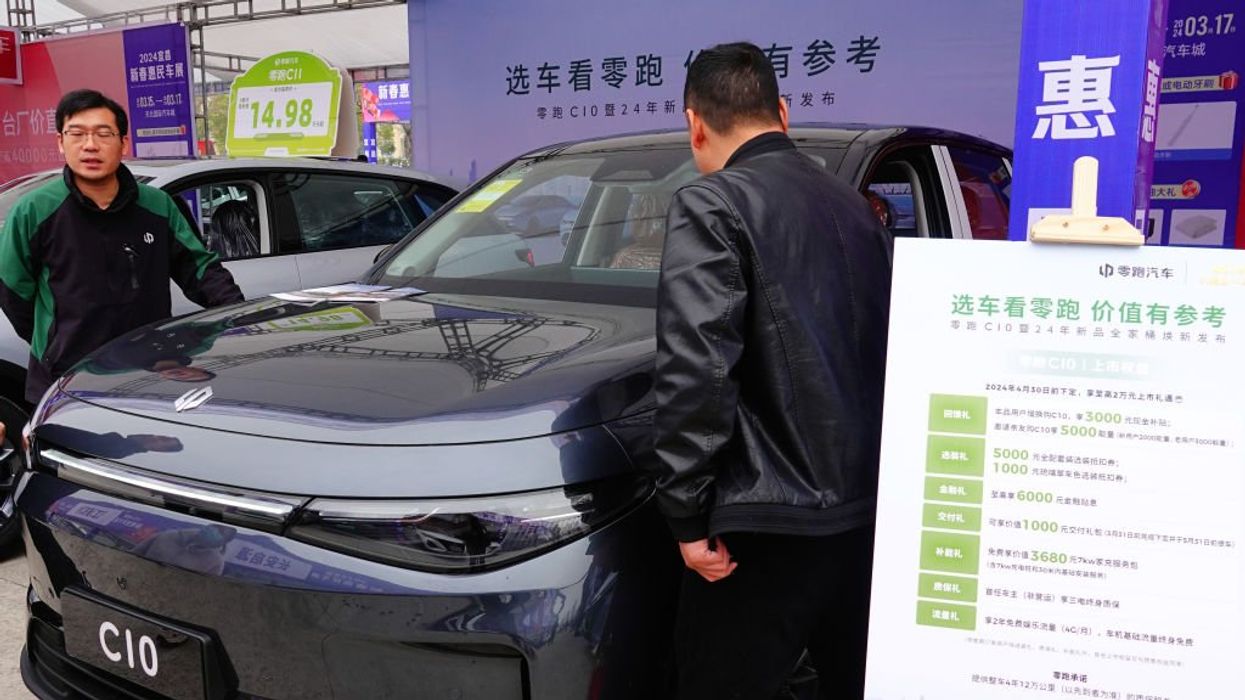
Getty Images/NurPhoto

Inflation Reduction Act loopholes hurt American automakers and consumers.
Are Chinese automakers benefitting from the Inflation Reduction Act's tax credits for new electric vehicle purchases? Deputy Treasury Secretary Wally Adeyemo says "no."
"What we see to date is that the companies that are taking advantage of it are American companies who are using it to make the investments that they need to be able to build out the cars of the future, which are electric vehicles," Adeyemo said at a hearing on federal EV incentives held by the Senate Committee on Energy and Natural Resources.
"My problem is not with EVs. My problem is with my administration's crusade to convert everyone over to an EV ..."
What role Chinese automakers play in this future depends on how strictly the Biden administration enforces a provision that blocks tax credits for new EVs that contain battery materials from foreign adversaries such as China.
More than 7,000 dealers registered to offer point-of-sale EV tax credits for 2024 under section 30D of the Act. But since January 1, any new EV using battery components made or assembled by a "foreign entity of concern" (companies or subsidiaries owned or controlled by China, Iran, North Korea, or Russia) have been ineligible for these credits.
In 2025, the exclusion will expand to include the use of any critical minerals that are extracted, processed, or recycled by one of those entities.
The Truth About Chinese Automakers and EV Tax Creditsyoutu.be
Ostensibly the regulations try to strike a balance, leaving some room for Chinese involvement as automakers reshuffle their supply chains into compliance. A too-strict interpretation of the term could have prevented any EVs from qualifying, while a too-lenient approach could risk national security and undermine domestic automakers.
That said, the requirements are strict enough to have slashed the number of qualifying models from 25 to just 13, according to federal data from FuelEconomy.GOV. However, some automakers such as General Motors have said they expect more EVs will qualify as they adjust sourcing.
“Section 30D is helping Ford and GM be able to be in a position to not only compete with Chinese automakers … but to win not only here in the United States but around the world," Adeyemo said.
The Biden administration has faced harsh criticism for its implementation of the EV tax credits, namely from Republicans — none of whom supported the Inflation Reduction Act — and Senator Joe Manchin (D-W.V.) who held the key vote in passing the law and helped write it.
Manchin, who chairs the Senate Energy Committee, has blasted the administration for not going far enough in preventing loopholes that could benefit China, which dominates the EV battery supply chain.
At issue, in part, is the Treasury's foreign entity guidance, which includes a temporary transition rule through 2026 that gives the industry time to develop standards for tracing materials that account for less than 2% of the value of battery-critical minerals.
"My problem is not with EVs," Manchin said at the hearing. "My problem is with my administration's crusade to convert everyone over to an EV regardless of where the battery came from or what the law actually says."
Republican senators on the panel, including ranking member John Barrasso of Wyoming and Josh Hawley of Missouri, also scrutinized the administration's implementation of the tax credit and the potential for Chinese participation.
"Your rule allows Chinese companies to get the tax break. It loosens up the restrictions, so now we are subsidizing our rivals," Hawley argued.
Deputy Energy Secretary Dave Turk, who also testified at the hearing, defended the administration's approach.
"I would strongly disagree with that," said Turk, citing how fewer EVs are now eligible for the credit as automakers scramble to adjust their sourcing and meet the requirements.
Manchin, who last year said he would sue the Treasury over how it was planning to interpret the EV tax credit's critical mineral and battery component provisions, again threatened legal action.
He said, ”I will support any entity that goes to court to correct the illegal liberalization of this law with an amicus brief to set the record straight on the bill Congress actually wrote.”